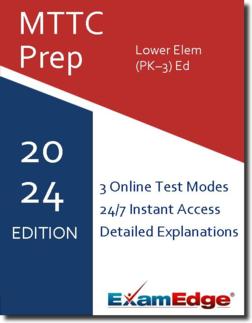MTTC Lower Elementary (PK–3) Education Practice Tests & Test Prep by Exam Edge - Topics
Excellent
** Sample images, content may not apply to your exam **
Understanding what is on the MTTC Lower Elem (PK–3) Ed exam is crucial step in preparing for the exam. You will need to have an understanding of the testing domain (topics covered) to be sure you are studying the correct information.
- Directs your study efforts toward the most relevant areas.
- Ensures efficient and adequate preparation.
- Helps identify strengths and weaknesses.
- Allows for a focused approach to address gaps in understanding.
- Aligns your preparation with the exam's expectations.
- Increases the likelihood of success.
- Keeps you informed about your field's current demands and standards.
Not ready to purchase our complete practice tests yet? Start with a MTTC Lower Elementary (PK–3) Education FREE Practice Test first!
Understanding the exact breakdown of the MTTC Lower Elementary (PK–3) Education test will help you know what to expect and how to most effectively prepare. The MTTC Lower Elementary (PK–3) Education has 210 multiple-choice questions The exam will be broken down into the sections below:
| MTTC Lower Elementary (PK–3) Education Exam Blueprint | ||
|---|---|---|
| Domain Name | % | Number of Questions |
| Subtest 1: Professional Knowledge and Skills | ||
| Learner-Centered Supports | 60% | 32 |
| Professional Knowledge and Strategic Partnerships | 40% | 21 |
| Subtest 2: Literacy | ||
| Literacy in Context | 30% | 16 |
| Literacy Skills–Instruction and Practices | 30% | 16 |
| Literacy Processes–Instruction and Practices | 40% | 21 |
| Subtest 3: Mathematics | ||
| Mathematics-Specific Teaching Practices | 20% | 11 |
| Mathematical Knowledge for Teaching Grades PK–3: Attribution and Counting and Whole Number Representation | 40% | 21 |
| Mathematical Knowledge for Teaching Grades PK–3: Early Fraction Representation and Whole Number Operation | 40% | 21 |
| Subtest 4: Science and Social Studies | ||
| Science–Engaging Children in 3-Dimensional Science Learning | 25% | 13 |
| Science–Children's Sense-making and Science Teaching Pedagogy | 25% | 13 |
| Social Studies–Instruction and Practices | 50% | 26 |






